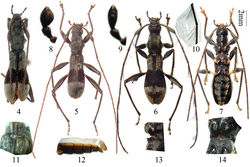Clytomelegena
| Notice: | This page is derived from the original publication listed below, whose author(s) should always be credited. Further contributors may edit and improve the content of this page and, consequently, need to be credited as well (see page history). Any assessment of factual correctness requires a careful review of the original article as well as of subsequent contributions.
If you are uncertain whether your planned contribution is correct or not, we suggest that you use the associated discussion page instead of editing the page directly. This page should be cited as follows (rationale):
Citation formats to copy and paste
BibTeX: @article{Lin2012ZooKeys216, RIS/ Endnote: TY - JOUR Wikipedia/ Citizendium: <ref name="Lin2012ZooKeys216">{{Citation See also the citation download page at the journal. |
Ordo: Coleoptera
Familia: Disteniidae
Name
Clytomelegena Pic, 1928 – Wikispecies link – Pensoft Profile
- Clytomelegena Pic, 1928: 11. Type-species: Clytomelegena postaurata Pic, 1928. Monotypy. —Villiers 1958[1]: 267.
- Noeconia Murzin, 1988: 161. syn. n. Type-species: Noeconia kabakovi Murzin, 1988. Original designation and monotypy.
Redescription
Body small, slender; elytra not wider than prothorax at humeri and widened behind middle. Eyes finely faceted, oval; with very small emargination. Prothorax subequal to or more than 1.5 times as long as basal width, with round lateral tubercles behind middle; with a slight apical constriction, apical part subequal to or a little narrower than base. Scutellum pentagonal. Elytra depressed behind scutellum, swollen behind middle, evenly rounded apically. Hind wings reduced (Fig. 11; not mentioned in either of the original descriptions). Antennae thin, about 1.5 to 1.8 times as long as body, 3rd to 10th antennal joints internally with recumbent undulating long hairs, reaching the apex of corresponding joint. Procoxal cavity open behind (Fig. 14). Femora spindle-shaped, petiolate (Fig. 7); male hind femora reach elytral apex. Middle tibiae with an oblique groove bearing a brush of hairs. 1st joint of posterior tarsi shorter than or subequal to following two joints together.
Remarks
The genus belongs to the tribe Disteniini, close to Nericonia Pascoe and Noemia Pascoe, but differs by having the elytra swollen (Murzin 1988[2]) and hind wings lacking. Our study of Noeconia kabakovi Murzin, 1988 revealed no huge high-level differences from Clytomelegena postaurata Pic, 1928, and therefore Noeconia Murzin, 1988 is herein synonymized with Clytomelegena Pic, 1928. It hosts two species up to now: Clytomelegena postaurata Pic, 1928 and Clytomelegena kabakovi (Murzin, 1988), comb. n.
Two flightless Oriental genera are known up to now: Clytomelegena Pic, 1928 and Olemehlia Holzschuh, 2011.
Distribution:
China (new country record): Guangxi Prov.; Laos (new country record): Attapeu Prov.; Vietnam: Vinh Phuc Prov., Batkhay Prov., Ninh Binh Prov. (Cuc Phuong National Park, new province record), Cao Bang Prov. (new province record), Lamdong Prov.
Taxon Treatment
- Lin, M; Murzin, S; 2012: A study on the apterous genus Clytomelegena Pic, 1928 (Coleoptera, Disteniidae) ZooKeys, 216: 13-21. doi
Other References
- ↑ Villiers A (1958) Notes sur les Disteniinae de la région indo-pacifique (Col. Cerambycidae). Bulletin du Muséum National d'Histoire Naturelle de Paris (2ème série) 30 (3): 262–270.
- ↑ Murzin S (1988) New species of Timber-Beetles (Coleoptera, Cerambycidae) from Viet-Nam. In: Medvedev L Striganova B (Ed). Fauna and Ecology of Insects of Viet-Nam. “Nauka”, Moscow: 161-168. [in Russian]
Images
|
